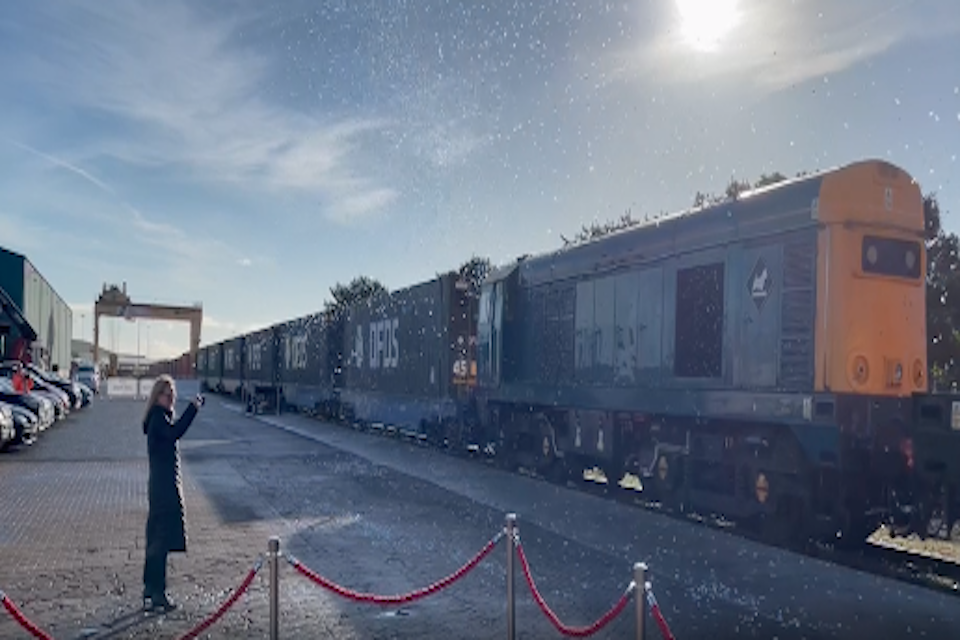Associated British Ports tell consultation to remember rail freight

In response to the public consultation on the future of transport in northern England, Associated British Ports have told the regional body, Transport for the North, that rail freight must not be overlooked. ABP Regional Director Simon Bird has told TfN that rail freight is vital to the region’s economic future.
Associated British Ports response to the Transport for the North’s consultation has made some key points and asks that TfN put forward some key projects that will help improve freight moves around the region and sustainably unlock future economic growth.
Crucial for business
Associated British Ports claims its four ports complex on the River Humber represents the largest port complex in the UK, handling 17 per cent of the nation’s trade, and is a vital link in the chain of moving freight around the country. Aside from 6,700 daily heavy goods vehicle movements, the Humber Ports generate around 150 trains every week.

“Last month saw the very welcome launch of Transport for the North’s consultation on their Future Freight and Logistics Strategy”, says Simon Bird. “All too often when contemplating how our transport networks should evolve, the focus for discussion is about the movement of people, but the movement of freight is essential to each of us, as individuals, in getting the things we need, but it is also crucial for businesses to access supplies, to export finished products, and to grow, and create jobs.”
Critical capacity shortages
The Transport for the North public consultation on Freight and Logistics Strategy for the North of England will address the challenges that lie ahead for the sector and the region. “The freight and logistics sector is vitally important for the North of England, with more than 33 per cent of goods entering through the region’s ports and 25 per cent of GB freight starting or ending in the North.

Rail features strongly in the consultation, and with ABP laying claim to the most rail-connected inventory of port operations around the UK, they are keen to make their voice heard. The rail sector faces many challenges and constraints, including a critical shortage of warehouse capacity, and TfN recognises the lack of reliable and efficient east-west connectivity across the Pennine mountains and disproportionate reliance on ports in the South of England.
Speed up engineering projects
Being rail connected, ABP wants to make more use of that capacity. “One way that we can make a significant contribution to decarbonising our work is to move a substantial proportion of those almost 7,000 lorries onto rail”, says Bird. “To make this cost-effective, however, we need freight to be given greater priority on rail than at present. Too often, freight trains are shunted into sidings to allow passenger trains to pass, and an increase to rail freight priorities will help.”
Bird also wants a faster completion of engineering projects, making the northern network, particularly the trans-Pennine routes, more robust and flexible. “We also think the rail gauge clearance and electrification work planned to be completed in 2026 could be brought forward to 2024″, he says. “Added to the speedy completion of the Manchester Rail Capacity study to help us to get more rail freight to Trafford Park, and we have a list of minor changes that could help a great deal.’ Bird alludes to the chronic congestion in the Castlefield Corridor, a frequent topic of conversation here and elsewhere.
Big ask includes road elopement
However, ABP’s big ask is road-based and seeks a second crossing of the Humber Estuary to be added to a proposed tidal barrier – a project already under consideration. Nevertheless, there is no mention of rail in this plan. Still, there is capacity already available on both river banks – a legacy of the much reduced heavy industry in the area.
Simon Bird says putting in a new crossing would reduce congestion in Hull, forge new economic ties between Grimsby and Hull, speed up the movement, and increase the reliability of freight, which could benefit business across the North. “The time is right to think boldly about the future of our transport”, he says. The message for the rail freight industry would appear to be that to figure in the TfN Freight and Logistics Strategy, it needs to be as bold as well in making its ‘big asks’.
You just read one of our premium articles free of charge
Want full access? Take advantage of our exclusive offer




